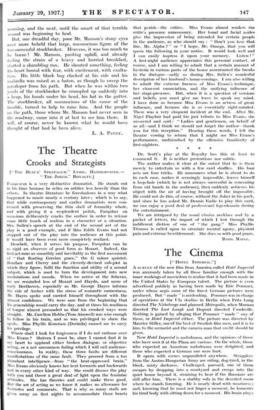The Theatre
Crooks and Strategists
[" T►IE BEAUX' STRATAGEM." LYRIC. HAMMERSMITH.— " THE JOKER." ROYALTY.]
FARQUHAR is a very distinctive dramatist. He stands out in his time because he relies on artifice less heavily than the others. In theatre literature he foreshadows in a way what happened to music nearly a century later ; which is to say, that while contemporary and earlier dramatists were con- cerned with preserving the thin shell of formality whole, and with giving it a resplendent polish, Farquhar on occasions deliberately cracks the surface in order to release some little touch of realism in a character or a situation. Mrs. Sullen's speech at the end of the second act of the play is a good example, and if Miss Edith Evans had not stepped out of the play into the audience at this pointy it would have been even more completely realized.
Howbeit, when it serves his purpose, Farquhar can be as rigid an observer of good form as Mozart. Indeed, the first act runs as smoothly and inevitably as the first movement of " that floating Grecian grace," the G minor quintet. Boniface and Cherry and the cleverly-devised sub-plot in which they figure, fulfil the function and utility of a second subject, which is used to turn the development into new modulations and moods. When we arrive at the Scherzo, we are reminded less of Mozart and Haydn, and more of early Beethoven, especially as Mr. George Hayes informs the role of Archer with the stress of romantic earnestness. Mr. Hayes spoke and carried himself throughout with the utmost confidence. We were sure from the beginning that his generalship would carry the day, and at times his readiness of tongue almost persuaded us that his crooked ways were straight. Mr. Carelton Hobbs (Tom 'Unwell) was wise enough to follow in his train, and so was privileged to share the Spoils. Miss Phyllis Konstam (Dorinda) caused me to envy Lis privilege.
Where shall I look for forgiveness if I do not enthuse over Miss Evans ? Shriven I must be, since I cannot find it in my heart to applaud either broken dialogue, or objective acting, or a not uncommon failing which I will call audience- consciousness. In reality, these three faults are different manifestations of the same fault. They proceed from a too abundant intelligence—from " the heat-oppressed brain." Miss Evans obviously knows her text forwards and backwards and in every other kind of way. She could discuss the play With you and throw a great deal of light upon the feminine attitudes. She has theories and could make them good. But the art of acting as we know it makes no allowance fcir footnotes and comments. That is why so many stalls are given away on first nights to accommodate those beasts
that perish—the critics. Miss Evans almost renders the critic's presence unnecessary. Her tonal and facial asides give the impression of being intended for certain people in the audience, as who should say : " Don't you love that line, Mr. Alpha ? " or " I hope, Mr. Omega, that you will quote the following in your notice. It would look well and I can easily impress it upon your memory. Listen ! " A first-night audience appreciates this personal contact, of course, and I am willing to admit that a certain amount of hysteria in various parts of the house accentuated the breaks in the dialogue—sadly so during Mrs. Sullen's wonderful description of her husband's home-comings. I am also willing to admit the extreme fineness of Miss Evans's technique, her clear-cut enunciation, and the unifying influence of her stage-presence. But, when it is a question of versions and beliefs, you must give me leave to speak my mind. I have done so because Miss Evans is an actress of great influence, and because she is so essentially right-minded. There was a very eloquent incident at the end. After Mr. Nigel Playfair had paid his just tribute to Miss Evans, she answered and said : " Ladies and gentlemen, on behalf of us all—and I think we should not forget the author—thank you for this reception." Hearing these words, I left the theatre vowing to return that I might see Miss Evans's performance, undisturbed by the offensive faniilitrity of first-nighters.
Dr. Scott's play at the Royalty has this at least to commend it. It is neither pretentious nor subtle.
The author makes it clear at the outset that he is there merely to entertain us with a few card shuffles. His four acts are four tricks. He announces what he is about to do in each case, makes it seemingly impossible, leaves himself a loop-hole (which he is not always successful in concealing from old hands in the audience), then suddenly achieves his object with the air of having brought off the impossible. He could not do this, of course, without the Joker in his pack, and since lie has asked Mr. Dennis Eadie to play this card, we can enjoy a good deal of professional legerdemain during the entertainment.
We are intrigued by the usual elusive necklace and by a packet of letters, the import of which I lost through the indifferent diction of one of " the gang." Miss Phyllis Titmuss is called upon to simulate mental agony, physical pain and extreme bewilderment. She does so with good grace.
BASIL MAINE.






































 Previous page
Previous page